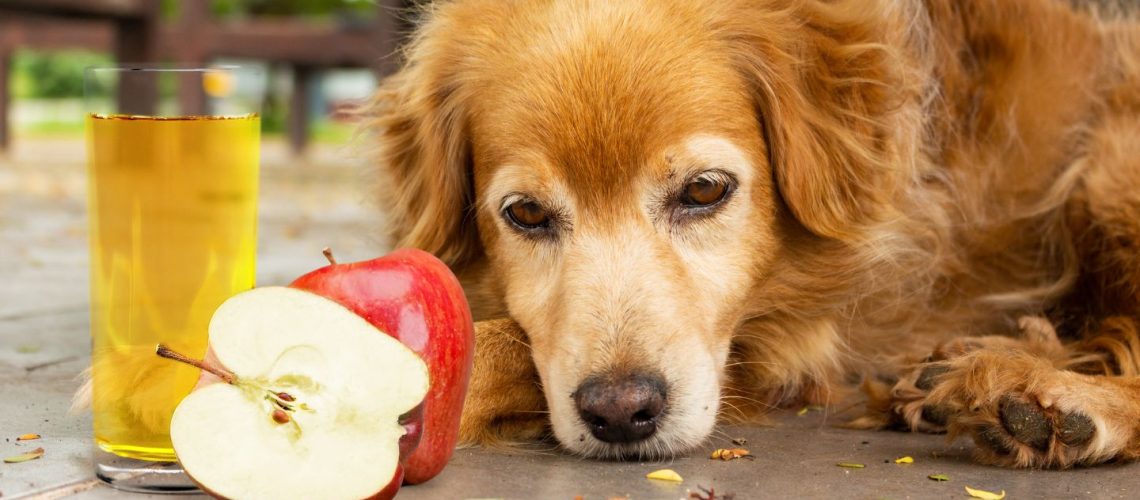The short answer to the question of whether dogs can drink apple juice is no, dogs should not be given apple juice. While apples themselves can be a healthy and tasty treat for dogs, the juice from apples can be harmful to their health. Apple juice contains a high amount of sugar, which can be harmful to dogs when consumed in large quantities, and may also contain preservatives and other additives that can be toxic to dogs.
The Composition of Apple Juice
Apple juice is a popular beverage for humans, but its composition can be harmful to dogs. Some elements of apple juice that can cause problems include:
Natural sugars
While natural sugars in fruits are generally safe for humans, they can be harmful to dogs when consumed in large quantities.
Artificial sweeteners
Some apple juices contain artificial sweeteners, which can be toxic to dogs. Xylitol, for example, is a common artificial sweetener that is extremely dangerous for dogs.
Preservatives and additives
Many commercial apple juices contain various preservatives and additives that help extend their shelf life. These can be toxic to dogs and cause gastrointestinal issues and other health problems.
Health Risks Associated with Apple Juice Consumption in Dogs
There are several risks associated with dogs consuming apple juice, including:
Sugar and obesity
Excessive sugar consumption can lead to weight gain and obesity in dogs, increasing the risk of health problems such as diabetes and heart disease.
Dental problems
High sugar intake can also damage a dog's teeth, resulting in tooth decay and gum disease.
Gastrointestinal issues
The additives and preservatives in apple juice can cause gastrointestinal upset, including vomiting and diarrhea.
Allergic reactions
Some dogs may have an allergic reaction to the ingredients in apple juice, resulting in itching or swelling.
Risk of toxicity
Artificial sweeteners, such as xylitol, can be toxic to dogs, leading to severe health issues and even death.
Signs of Apple Juice Toxicity in Dogs
If your dog has consumed apple juice, be on the lookout for signs of toxicity, which may include:
Vomiting and diarrhea
Lethargy
Abdominal pain
Rapid heart rate
Seizures
What to Do If Your Dog Drinks Apple Juice
If you believe your dog has consumed apple juice, take the following steps:
Contact your veterinarian
Inform your vet about the situation, and they will provide guidance on how to proceed.
Monitor for symptoms
Keep an eye on your dog and watch for any signs of apple juice toxicity.
Provide proper care and support
Make sure to provide your dog with fresh water and any other care recommended by your veterinarian.
Safe Fruits and Treats for Dogs
There are many safe treats and fruits for dogs that can be enjoyed in moderation. Some examples include:
Apples without seeds and core
Blueberries
Carrots
Watermelon (seedless)
Green beans
Tips for Keeping Your Dog Hydrated
To ensure your dog stays properly hydrated, follow these tips:
Providing fresh water daily
Make sure your dog always has access to clean, fresh water.
Using a water fountain for dogs
These can help encourage your dog to drink more water throughout the day.
Encouraging water consumption with toys and treats
Use interactive toys and treats designed to encourage your dog to drink water.
Monitoring your dog's water intake
Keep track of how much water your dog consumes to ensure they are staying properly hydrated.
Final Thoughts
It's crucial to feed your dog a balanced diet and provide them with safe treats and beverages. Consult with your veterinarian about the best options for your dog and avoid giving them apple juice due to the potential risks to their health. Instead, opt for safe fruits and treats and ensure they have access to fresh water to keep them hydrated and healthy.











